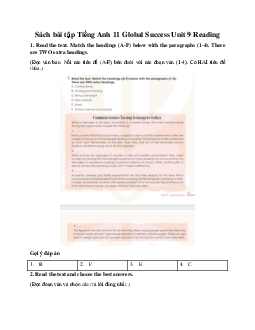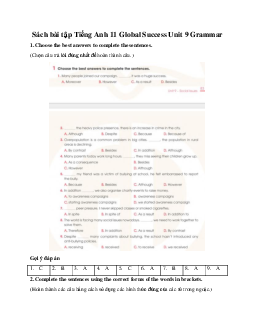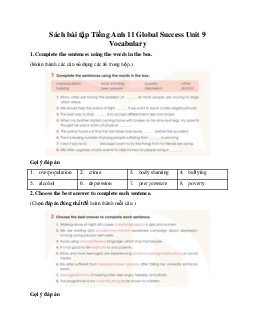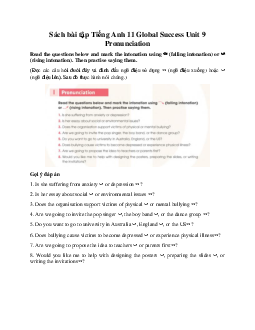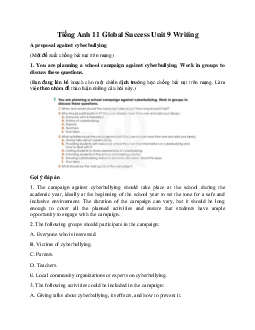



Preview text:
Tiếng Anh 11 Global Success Unit 9 Reading
Peer pressure (Áp lực đồng trang lứa)
1. Work in pairs. Discuss the question.
(Làm việc theo cặp. Thảo luận câu hỏi.)
Have your friends ever made you do something you do not like? If yes, give an example.
(Bạn của bạn đã từng khiến bạn làm điều gì bạn không thích chưa? Nếu có, hãy cho ví dụ.) Gợi ý đáp án
1. I have a lot of comics and my friends often borrow them from me. I'm fine with that.
However, there is one friend who borrowed comics from me, but whenever she returned
them, my comics are terrible! They were torn, dirty and there were even some drawings
on one of them! To be honest, I don't like lending her my books, but I don't want her to
tell anything bad about me to other friends. That's the reason why I still keep lending her my comics.
2. I don't like to get piercings, but some of friends in my group got piercings on their ears
and nose. Although I find it too rebellious for me to follow, I still got some piersings on
my ears because my group call them "friendship piercings". But I only felt hurt when getting them...
2. Read the article. Match the highlighted words and phrases with their meanings.
(Đọc bài báo. Nối các từ và cụm từ được làm nổi bật với ý nghĩa của chúng.) Gợi ý đáp án 1. d 2. c 3. b 4. a
3. Read the article again. Which paragraph contains the following information? Write A, B, or C.
(Đọc lại bài viết. Đoạn nào chứa thông tin sau? Viết A, B, hoặc C.) Gợi ý đáp án 1. A 2. B 3. C 4. A
4. Read the article again and choose the correct answers A, B, or C.
(Đọc bài viết một lần nữa và chọn câu trả lời đúng A, B hoặc C.) Gợi ý đáp án 1. C 2. A 3. C 4. B
5. Work in pairs. Discuss the following question.
(Làm việc theo cặp. Thảo luận câu hỏi sau.)
Have you, or has someone you know, experienced any of the problems mentioned in this article?
(Bạn hoặc người bạn quen đã trải qua bất cứ vấn đề nào được đề cập trên bài báo không?) Gợi ý đáp án
Khoa is a 16-year-old high school student who loves spending time with his group of
friends after school. They usually go to the mall, play sports or video games, or just hang
out at each other's houses. However, Khoa's parents are becoming increasingly concerned
about his friends' behavior and influence on him. They've noticed that Khoa is staying out
later than usual, neglecting his school work, and acting more rebellious and disrespectful at home.
Khoa's parents have tried to talk to him about their concerns and suggest that he spend
less time with his friends or choose better friends, but Khoa resists their efforts. He
argues that his friends are cool and fun to be with, and that his parents are just being overprotective and boring.
The situation becomes more tense when Khoa's parents find out that some of his friends
have been caught smoking and shoplifting. They forbid Khoa from hanging out with
them and threaten to punish him if he disobeys. Khoa feels torn between his loyalty to his
friends and his respect for his parents' authority.
In this scenario, Khoa and his parents are facing a common problem of conflicting values
and priorities. Khoa wants to belong to his peer group and have fun, while his parents
want to protect him from negative influences and ensure his future success. It's not easy
for either side to compromise or understand each other's perspective, but communication
and empathy can help bridge the gap.
